Labor of Loss, a podcast series by the USAID Asia Counter Trafficking in Persons Project and Freedom Collaborative, explores experiences of human trafficking and labor exploitation across Asia, taking listeners on a journey from a fishing fleet in South Korea to a palm oil plantation in Malaysia to a brick kiln in Cambodia. Guests - ranging from trafficking survivors to frontline responders and legal rights advocates - will share their stories, debunk common misconceptions, and dive into a complex world of human exploitation – and hope.
In the first episode we head out to sea and find out what life is like for migrant fishermen. We meet Indonesian fisherman Ari and a South Korea-based lawyer named JC Kim. They didn’t know it, but they were looking for each other for years – and their meeting created a spark for policy change that could transform the way the industry works.
"This drawing of mine shows my accident where I lost my hand in the brickyard, in the factory." In this episode, we take a look inside the brick industry and the pervasive practice of debt bondage made worse by climate change – via a tour of three works of art by a remarkable Cambodian artist, who used to work in a brick kiln...until he couldn’t.
This episode, a show in two parts – and both of them are about palm oil plantations in Malaysia. First, with Manggalam, we explore the colonial legacy of migrant labor, when palm plantations were still rubber plantations and workers were indentured. And then, we hear from two NGOs who are tackling current problems in the industry in very different ways: one using a carrot and one using a stick.
We head back to Malaysia and hear about the women who leave their own homes and families to live abroad as domestic workers. They raise entire generations of kids across Asia and care for the elderly. They keep households all over the region running… but who cares for the carers?
This episode, COVID-19 and migrant construction workers in the Gulf states. What happens to the most vulnerable workers when the world is stopped by a global pandemic? We go back in time with researchers Mustafa and his colleague Rameshwar, and trace what happened as the disaster unfolded.
This episode looks at a type of exploitation women in particular face: being forced into marriage. We go on a harrowing journey with Srey Pov, a young woman from Cambodia who was told she'd be working in a shoe factory in China, but instead was forced into marriage. What's the best way to help those who fall into deceptive and often abusive marriages? We hear from both frontline responders and researchers to find out.
In the last episode of the series, we look at the big picture. What's driving human trafficking and what needs to be done to stop it? Hear unique perspectives from earlier guests Archana and Mustafa joined by Bijaya who is working to secure the rights of migrants in Nepal. Exploitation is deeply entrenched, but is change possible and what does it look like? Listen in for our final take.




